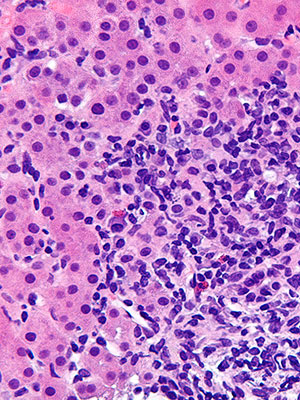
Drug-induced liver injury (DILI) is an uncommon, complex and potentially severe adverse drug reaction to the use of medications, herbal products or dietary supplements. Idiosyncratic DILI is attributable to medicinal products taken in a therapeutic dose and has been described in association with over 650 drugs used in clinical practice. DILI has been typically classified into an intrinsic type (predictable, dose-related), and idiosyncratic (unpredictable, not dose-related). Idiosyncratic DILI represents one of the most challenging liver disorders due to the plethora of drugs used in clinical practice, its variable presentation which can mimic other conditions and the current absence of specific biomarkers.
Incidence of idiosyncratic DILI is relatively low. European population-based estimated and incidence of 14 to 19 cases per 100,000 inhabitants. Although the majority of DILI patients recover spontaneously, DILI can be severe, and in some cases, it can progress to acute liver failure (ALF), which necessitates liver transplantation or results in death.
Therefore, to deepen in the understanding of DILI, there is a need of a collaborative effort accounting with different stakeholders to build a prospective European DILI registry following a standardized methodology in the detection and recruitment of cases and collection of biological samples as a first and crucial step to conduct innovative large-scale studies in DILI.
The proposal for the creation of this Consortium comes in sequence of the grant that was conceded by EASL to create a prospective European DILI Registry back in 2014. Building on from this, we have developed a multidisciplinary network of over 60 top European experts coming from 28 countries, “Prospective European Drug-induced Liver Injury Network” (https://proeurodilinet.eu/) with the grant that we secured in 2017 from the European Cooperation in Science & Technology (COST ACTION 17112).